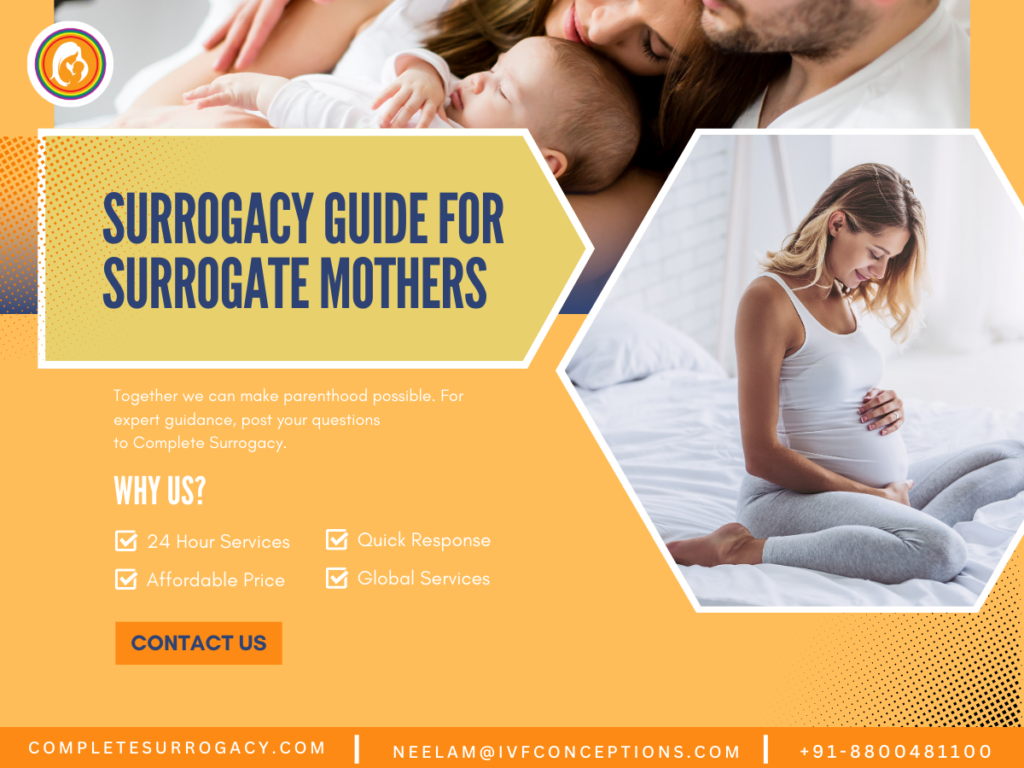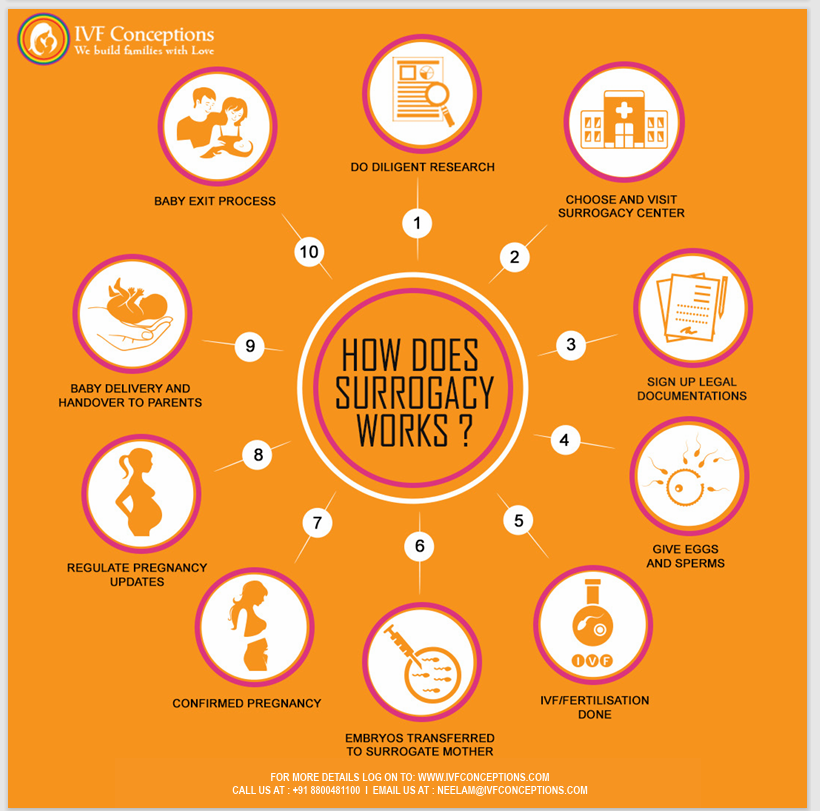If you are thinking about becoming a surrogate, there is a lot you need to know. From understanding how surrogacy works to finding out about compensation for surrogates, and even getting tips on how to apply, we’ve got answers to all your burning questions about being a surrogate mother.

The Ultimate Guide to Becoming a Surrogate Mother
Becoming a surrogate mother is a decision that requires immense strength, selflessness, and compassion. It is a unique and selfless act of carrying and giving birth to a child for another individual or couple who are unable to do so themselves.
- Book an online appointment: Get a free online consultation.
- Call\W:+91-8800481100 Email:neelam@ivfconceptions.com
The journey of being a surrogate mother is a fulfilling and life-changing experience, as it allows individuals to help fulfill the dreams of parenthood for others. However, the process of becoming a surrogate mother can seem daunting and overwhelming for many, with numerous legal, medical, and emotional considerations to take into account.
Additional Resources to Read:
Surrogacy with 2 Surrogate Mothers
What is the Surrogacy Intake Process For Surrogate Mother
How Intended Parents Can Support Their Surrogate?
Who are Surrogate Mothers: Become A Surrogate Mother
That is why we have put together the ultimate guide to becoming a surrogate mother. In this comprehensive guide, we will provide valuable insights and information to help individuals navigate the complex and rewarding journey of becoming a surrogate mother. From understanding the legal and medical requirements to finding the right agency and preparing for the emotional journey ahead, this guide will serve as a valuable resource for those considering surrogacy. So, whether you are a potential surrogate or simply curious about the surrogacy process, this guide is for you. Let’s dive in and explore the world of surrogacy together.
How to become a surrogate mother?
Becoming a surrogate mother is a generous and life-changing decision. It involves carrying a pregnancy for intended parents who are unable to conceive or carry a child on their own. If you are considering becoming a surrogate mother, here’s a guide to help you understand the process and what to expect.
- Research and Education Yourself/ learning more about gestational surrogacy will give you make right choice
Start by researching surrogacy and familiarize yourself with the laws, regulations, and ethical considerations in your country or state. Each jurisdiction may have specific requirements and guidelines for surrogacy. surrogacy is an important and life-changing journey so make sure to put your best foot forward.
Learn about the different types of surrogacy arrangements, including traditional surrogacy (where the surrogate’s own egg is used) and gestational surrogacy (where the embryo is created using the intended parents’ or donor’s egg and sperm).
Understand the emotional, physical, and legal aspects of being a surrogate mother.
- Check Your Surrogate Mother Eligibility Criteria:
Surrogacy agencies or clinics usually have specific eligibility criteria for surrogate mothers. Finding a gestational carrier takes time. Common requirements include:
- Age: Typically between 21 and 40 years old.
- Previous childbirth: You may need to have at least one uncomplicated pregnancy and delivery.
- Health: Good overall physical and mental health.
- Lifestyle: A non-smoker and non-drug user. Healthy lifestyle choices are usually preferred.
- Support: Adequate emotional support from your spouse or partner, if applicable.
- Location: Some agencies prefer surrogate mothers who live in proximity to the intended parents’ location or the fertility clinic.
- Medical and Psychological Screening: Expect to undergo a comprehensive medical evaluation, including physical examinations, blood tests, and screenings for infectious diseases.
You will also be required to undergo psychological evaluations or counseling to ensure you are mentally prepared for the emotional challenges of surrogacy.
- Be Aware of Legal Considerations:
Consult with a reproductive law attorney who specializes in surrogacy. They will guide you through the legal process, including drafting and reviewing contracts, ensuring the intended parents’ rights and your rights are protected.
Discuss legal matters such as compensation, medical expenses, termination of pregnancy, and parental rights and responsibilities.
- Choosing an Agency or Independent Matching:
Decide whether you want to work with a surrogacy agency or pursue an independent matching process. Agencies can provide support, and guidance, and match you with intended parents, while independent matching involves finding intended parents on your own.
Research and select a reputable agency or find a reliable method for independent matching. Read reviews, speak with other surrogate mothers, and ensure you are comfortable with the process and the support provided.
- Building a Relationship with Intended Parents:
Establish open and honest communication with the intended parents. Building trust and maintaining a positive relationship is crucial throughout the surrogacy journey.
Discuss expectations, boundaries, and preferences regarding contact during and after the pregnancy. If you are taking a surrogate through an agency they might have done an initial screening to make sure she is the right candidate for you.
Surrogate Mother/Gestational Carrier steps and timeline for surrogacy journey
Step | Description | Timeline |
1. Research surrogacy | Learn about the surrogacy process, legal issues, risks, etc. to see if it’s right for you. | 1-2 months |
2. Consult with professionals | Speak with a fertility doctor, lawyer, and mental health professional to understand all aspects. | 1-2 months |
3. Choose an agency | If going through an agency, research them thoroughly before signing. | 1-2 months |
4. Complete screening | Undergo medical tests, background checks, mental health evaluation. | 1-3 months |
5. Review legal contract | Review in depth and understand thoroughly before signing a surrogacy contract. | 1-2 weeks |
6. Start medical procedures | Begin medications, injections, implantation of embryo/pregnancy. | 1 month |
7. Attend appointments | Go to regular doctor visits, ultrasounds, check-ups throughout pregnancy. | 9 months (pregnancy) |
8. Prepare for delivery | Take birthing classes, create birth plan and strategy for labor. | month 8 & 9 |
9. Delivery of baby | Give birth via vaginal delivery or c-section with intended parents and support team. | Pregnancy month 9 |
10. Postpartum period | Recover after birth, provide breastmilk if agreed upon, receive full compensation. | 4-6 weeks |
Understanding How Does Surrogacy Work?
Surrogacy is a deeply personal and emotional commitment for women who have the desire to help others create a family. It is a journey that encompasses not only the physical aspects of pregnancy but also the mental and emotional well-being of the surrogate mother.
#1. The Surrogacy Process: From Application to Parenthood
The surrogacy journey begins with the initial application process. Once you have decided to embark on this extraordinary path, you will need to fill out a surrogate application. This application serves as a crucial step in the screening process and helps the surrogacy agency understand your motivations, background, and suitability as a surrogate mother.
#2. The Importance of Screening: Ensuring the Best Match
After submitting your application, the surrogacy coordinator will thoroughly review it to assess your eligibility for surrogacy considering various factors, including your medical history, pregnancy and delivery experiences, financial stability, and lifestyle choices. It is important to note that these screening measures are in place to ensure the best possible match between surrogate mothers and intended parents.
#3. The Medical Process: Preparing for the Journey Ahead
Once you have successfully passed the screening process and been matched with your intended parents, the medical journey begins. As a surrogate mother, you will undergo a comprehensive medical screening at a reputable IVF clinic. This screening is essential to assess your overall health and determine your readiness for a surrogate pregnancy. Rest assured that you will receive the utmost care and support from our dedicated medical professionals throughout this process.
#4. The IVF Process: Bringing Dreams to Life
Upon passing the medical screening, the IVF process can commence. Under the guidance of skilled fertility specialists, you will begin taking IVF medications that prepare your body for pregnancy. During this stage, an embryo will be created using the intended parents’ biological material, or potentially with the assistance of an egg donor. This embryo will then be transferred into your uterus, offering the optimal environment for its development.
#5. Journey of Monitoring and Support: Nurturing a Life
Throughout your surrogacy journey, you will receive regular monitoring and support from our team. Beta tests and ultrasounds will be conducted to ensure the well-being of both you and the developing baby. Around the 12-week mark, you will transition to your own obstetrician-gynecologist for continued care.
#6. The Joyous Moment: Bringing Dreams to Reality
Delivery day is an emotional and joyous occasion for everyone involved. The intended parents, who have eagerly awaited this moment, will likely be present to welcome their baby into the world. As a surrogate mother, you have played an integral role in making their dreams come true, and witnessing their happiness is a truly magical experience. Handing the baby back to the intended parents symbolizes the fulfillment of your commitment and the beginning of a new chapter for all.
- Book an online appointment: Get a free online consultation.
- Call\W:+91-8800481100 Email:neelam@ivfconceptions.com
How Much do Surrogates Make?
The compensation for surrogates can vary greatly depending on various factors such as location, legal regulations, individual circumstances, and the specific terms of the surrogacy arrangement.
In the United States, for example, surrogacy compensation can range from $30,000 to $60,000 or more, but it’s important to note that these figures are approximate and can vary significantly.
The compensation is typically broken down into different components. Base compensation is the primary amount paid to the surrogate for her time, effort, and commitment throughout the pregnancy. This base compensation can be influenced by factors like the surrogate’s experience, location, and any potential medical or psychological risks associated with the pregnancy.
Additional expenses incurred during the surrogacy journey are usually covered separately. These expenses may include medical expenses, legal fees, maternity clothing, travel costs, and compensation for any lost wages or childcare expenses.
Certain states like California, Massachusetts, Connecticut, and New Jersey may offer higher base fees to surrogates due to their desirable locations. These states are in close proximity to reputable fertility clinics and airports, making it more convenient for international intended parents.
Additional Resources to Read:
9 Factors To Improve IVF Pregnancy Rate
Choosing Between International and Domestic Surrogacy
Surrogacy Cost In the USA: Exploring Surrogate Mother Costs
Estimation of surrogate mother compensation in different countries:
The average total compensation to the surrogate mother varies widely but we tried to give a general value for the surrogate payout. The wide range is due to the many factors that influence how much surrogates are paid.
The compensation can vary based on factors like:
- Cost of living in the country
- Regulations and laws around surrogacy
- Services provided by surrogacy agencies
- Experience level of the surrogate
Country | Average Compensation of Surrogate |
United States | $25,000 – $50,000 |
Canada | $20,000 – $35,000 |
Ukraine | $15,000 – $25,000 |
Georgia | $15,000 – $20,000 |
Greece | $15,000 – $20,000 |
India | $10,000 – $15,000 |
Kenya | $5,000 – $15,000 |
Mexico | $15,000 – $25,000 |
Thailand | $10,000 – $15,000 |
United Kingdom | $25,000 – $35,000 |
What are the Surrogate Mother Requirements That Intended Parents Should Consider?
The requirements for surrogate mothers can vary depending on the country, state, or agency involved, as well as the specific circumstances of the surrogacy arrangement. However, there are several common criteria that surrogate mothers typically need to meet. These surrogate requirements may include:
- Age of Surrogate Mother: Surrogates are usually required to be between the ages of 21 and 40, although this can vary. The specific age range may depend on the guidelines of the agency or fertility clinic involved.
- Physical and Mental Health: Surrogate candidates must undergo thorough medical and psychological evaluations to ensure they are physically and mentally healthy. This evaluation typically includes medical tests, screenings, and assessments of their overall well-being.
- Previous Pregnancy Experience: Many agencies prefer surrogate candidates who have previously carried a pregnancy to term and have given birth to a healthy child. This requirement helps ensure that the surrogate understands the physical and emotional demands of pregnancy. It is desired to have uncomplicated pregnancies and deliveries.
- Non-smoker and Non-Drug User: Surrogates are typically required to be non-smokers and non-drug users, as these habits can pose risks to the surrogate’s health and the baby’s well-being.
- Stable Lifestyle: Surrogates are often required to demonstrate a stable and supportive living environment for themselves and their families. This includes financial stability, a suitable home, and a reliable support system.
- Legal Eligibility: Surrogate candidates must meet the legal requirements set forth by the country or state where the surrogacy will take place. This may include being a legal resident or citizen and having the legal capacity to enter into a surrogacy agreement.
- Ideal body weight: Typically, a Body Mass Index (BMI) should be 20 to 33.
- Other desirable but not mandatory requirements like living in a surrogacy-friendly state, financial security, and medical insurance are preferred.
Conclusion
In conclusion, becoming a surrogate mother is a selfless and rewarding experience that can have a profound impact on the lives of others. It is a decision that should not be taken lightly, but with proper education, support, and guidance, it can be a fulfilling journey for both the surrogate and intended parents.
If you are considering becoming a surrogate, make sure to thoroughly research and consult with a reputable agency to ensure the best experience possible. Thank you for reading this ultimate guide to becoming a surrogate mother, and I wish you all the best on your surrogacy journey.
If you’d like to learn more about IVF, Egg Donation, or surrogacy services globally, check out the rest of our website at Complete Surrogacy Agency. We offer legally secure and affordable surrogacy consulting services for FREE.
For more resources on IVF and Surrogacy, browse our other web page- IVF Conceptions.
For more resources on IVF and Surrogacy, browse our other web page- Georgia Surrogacy Agency.
Our team has over 13 years of experience facilitating surrogacy arrangements, egg donation, and serving as an advocacy resource for infertile couples and LGBTQ individuals seeking to build families.
Our founder and chief surrogacy consultant, Neelam Chhagani, passionately helps couples struggling with fertility challenges. Since starting our surrogacy consulting agency in 2013, we’ve helped welcome over 500 babies for intended parents nationwide.
Our team includes experts from diverse backgrounds with leading reproductive attorneys, professionally trained top fertility doctors, former surrogacy case managers, experienced and kind surrogate mother and egg donor coordinators, mental health professionals specializing in infertility counseling, and a logistic support team to assist you in your chosen surrogacy country.
References used:
FAQs for the surrogacy process for a surrogate mother:
How does a surrogate mother get pregnant?
Unlike traditional pregnancy, gestational surrogacy pregnancy is achieved by using IVF to create embryos, and then embryos transfer to place on the surrogate’s uterus at a fertility clinic.
How does the surrogacy process work?
Surrogacy is a process that involves several steps, including screening and matching, legal agreements, medical procedures, pregnancy, and birth. It typically requires collaboration between the surrogate, intended parents, medical professionals, and legal experts.
What are the qualifications to become a surrogate mother?
The qualifications for surrogate mothers can vary, but they often include being within a certain age range (typically 21-40), having given birth to at least one child, having a healthy lifestyle, and passing medical and psychological evaluations. Each surrogacy program or agency may have its specific requirements.
How long does the surrogacy process take?
The duration of the surrogacy process can vary depending on various factors, including the time it takes to match a surrogate with intended parents, medical procedures, legal processes, and the time required for a successful pregnancy. It can take several months to over a year to complete the entire process.
What are the risks and complications associated with being a surrogate?
While surrogacy is generally considered safe, there are potential risks and complications associated with pregnancy and childbirth. Surrogates may experience physical discomfort, hormonal changes, and emotional challenges during the process.
What kind of support is available for surrogate mothers?
Reputable surrogacy agencies often provide extensive support to surrogate mothers throughout the process. This support may include medical care, counseling, legal guidance, and emotional support. Surrogates can also connect with other surrogates through support groups or online communities.
What financial compensation can I expect as a surrogate mother?
Surrogate compensation varies depending on factors such as location, agency, and specific arrangements. Compensation typically covers the base fee for the surrogate’s time and effort, as well as additional expenses related to the pregnancy. The surrogate mother costs around $50,000 to $60,000.
Will I have a relationship with the child after the birth?
The level of contact between the surrogate and the child after birth varies and is often outlined in the legal agreements. Some surrogacy arrangements involve ongoing communication and potential involvement in the child’s life, while others may involve more limited contact or none at all. This aspect is typically discussed and agreed upon beforehand.
Whose egg is used in surrogacy?
In the case of gestational surrogacy, mostly the intended mother’s eggs are used. In some cases, an egg donor is used if a female partner has low AMH or age-related infertility. In the case of traditional surrogacy, the surrogate mother’s eggs are used for conception
What is the role of a surrogate mother in the surrogacy process?
A surrogate mother carries and delivers a baby for intended parents who are unable to conceive or carry a pregnancy to term. In gestational surrogacy, the surrogate is not biologically related to the child, as the embryo is created using donor sperm or egg and IVF or in vitro fertilization techniques.
How does the surrogacy process work for a surrogate mother?
The surrogacy process involves a detailed reproductive and medical evaluation, followed by embryo transfer into the surrogate’s uterus. A surrogacy contract is then established to define the rights and responsibilities of the parties involved.
What steps are involved in becoming a surrogate?
To become a surrogate, one needs to undergo a thorough screening process and must meet certain criteria to qualify as a viable surrogate candidate. This involves psychological, medical, and lifestyle assessments to determine suitability for surrogacy pregnancy.
What are the main responsibilities of a gestational surrogate?
A gestational surrogate carries the pregnancy to term, adhering to all reproductive and medical protocols, and maintaining open communication with the intended parents throughout the surrogacy journey.
Table of Contents
Contact Us For A Free Surrogacy Consultation!
Hey, I’m Neelam. I’m determined to make a business grow. My only question is, will it be yours?

About Neelam
Neelam Chhagani, MA (Counselling Psychology), PGD (Mental Health), and Holistic Infertility and Third-Party Reproduction Consultant.
Member of European Fertility Society, Best Surrogacy Blogger of 2020, with 200 dedicated blogs and top contributor on Quora for Surrogacy.
Highly esteemed, authoritative, and trusted professional with a 14-year experience in international surrogacy. Advocate for Secure, Legal, and Affordable International Surrogacy.
Follow Us
Our Guarantee

Safe International Surrogacy
Global surrogacy options with best countries for surrogacy that are secure and affordable
Our Services Include:
- Personalized support and communication throughout the entire journey
- Access to affordable and high-quality ART medical facilities and treatments
- Global surrogacy options with best countries for surrogacy that are secure and affordable
- Same-sex surrogacy options – Best countries for gays surrogacy/LGBT Surrogacy
- Single parent surrogacy offered with low-cost surrogate mothers
- Guaranteed Surrogacy Baby Plan with cheapest surrogacy costs
- Legal support and guidance to ensure a smooth and secure surrogacy process
- Complete surrogacy guide so that Intended Parent makes informed choices
- Assistance in cryo-shipments
- Legal assistance from experienced reproductive attorneys
- Discovery consultations and case management
Frequently Asked Questions
Surrogacy laws and regulations vary significantly across countries and even within different states or regions. It is crucial to understand and comply with the legal framework governing surrogacy in the intended jurisdiction to ensure a smooth and legally protected surrogacy journey.
The duration of the surrogacy process typically ranges from one to two years, encompassing various factors that contribute to its timeline. These factors include the waiting period for egg donor, surrogate mother, the time required for the surrogate to conceive or number of IVF attempts, and other relevant variables.
The costs associated with surrogacy can vary widely depending on various variable and unpredictable factors such as the location, the chosen surrogacy agency, medical expenses, legal fees, and compensation for the surrogate.
That being said, intended parents can expect to pay somewhere $130,000 to $150,000 if you are looking for surrogacy in US. In case you are planning to do international surrogacy, the surrogacy price is between $50,000 to $70,000 depending upon the country and types of services taken.
Surrogacy has become an important option for LGBT+ couples who desire to have children biologically related to them. It provides an avenue for same-sex male couples or single men to become fathers and for same-sex female couples or single women to become mothers. Surrogacy has played a significant role in expanding the possibilities of family-building for the LGBT+ community. We recommend and assist you with surrogacy for gay couple in Mexico, Colombia, and Argentina. Similarly, for single parents surrogacy, above options are available.
Surrogacy success rates can vary depending on various factors, including the age and health of the intended parents, the quality of the embryos, and the experience and health of the surrogate. According to recent studies, the success rates of surrogacy can range from 40% to 70% per embryo transfer.
Surrogacy laws and regulations differ significantly from country to country. Some countries have embraced surrogacy and established clear legal frameworks, while others have banned or restricted the practice. It’s essential for intended parents to understand the legal landscape of surrogacy in their desired location and consider factors such as availability, cost, and legal protections. We will advise to consult a experienced surrogacy professional become engaging surrogacy abroad.
No, surrogacy laws vary from country to country. Some countries have banned or heavily restricted surrogacy, while others have well-defined legal frameworks. Countries like USA, Georgia and Ukraine allow commercial surrogacy. However, other countries like Canada, Australia and UK allow only altruistic surrogacy arrangements. Beside this most of the European countries do not recognise any form of surrogacy like Germany, France, Belgium, Sweden etc. Latin American countries like Colombia and Argentina only allowed affordable altruistic surrogacy.
The primary reason for preference for international surrogacy is the prohibition or restriction of surrogacy, or the allowance of only altruistic surrogacy, in the intended parents’ home countries.
In altruistic surrogacy, which involves finding a surrogate without any financial compensation, often presents challenges in terms of finding a suitable surrogate.
However, opting for international surrogacy not only reduce the overall average surrogacy cost but give opportunity to find a surrogate quickly and options to choose from many candidates.
Why Our Intended Parents Choose Us- Testimonials

Neelam is empathic and an awesome professional. She’s always available and eager to response to clients calls. She followed our process the way. Definitely recommend.
J&C (UK)
This whole journey has been absolutely wonderful. And I have such a beautiful daughter today. I have such an amazing army of family and friends surrounding me. She’s brought so much joy to everyone Especially me. I’m grateful that we moved forward I don’t know what I would do without her. So please let Mark now we made the right decision and yes I’m thinking about a second journey. I think it’s important to raise a child with a sibling. So two children seems like the right thing. Will make a final decision in the next 3 to 4 months.
S (USA)
Thank you so much for your handholding and for connecting me with everything. I am so grateful for the role that you’ve played. I’m the happiest father alive. Thank you so much for your guidance along the way. She’s adorable and I’m all gushy in love!!!
SE (USA)
Hoping to have wonder babies, we initiated the process with Neelam at IVF Conceptions. Her warm concerns and dedicated helps drive this process moving through frustrated change of surrogacy policy in India. Finally, the surrogacy was smoothly transferred to Russia and now, we saw our baby growing already. We greatly thank Neelam, who sincerely helped us to achieve our baby dream. There is no doubt that both IVF conceptions and IVF Sunrise provided excellent surrogacy service with transparent fund transactions.
PH (USA)
We are so glad to inform about arrival of twins for our single Intended Parent.. This was his first attempt with Asian egg donor and he was successful in first round of embryos transfer with twins. The pregnancy term was eventless and during routine visit on 34 weeks- doctor decided to CS as surrogate was 4 cm dilated. Babies are so cute and adorable and surrogate- doing well. It goes without saying J L is very delighted and busy dad!!!
JL SingaporeContact us!
We offer surrogacy programs in countries where it is legal, affordable, and safe for international intended parents.











I was introduced to Neelam by a friend who worked with Neelam for surrogacy. Neelam is absolutely wonderful. I am a single male and the journey to fatherhood is not that easy. Neelam connected me to a program ideal for my circumstances. She was with me throughout the pregnancy providing advice and guidance along the way. I am so grateful I found her and am thrilled today that I have a beautiful daughter. I highly recommend Neelam to anyone who is on a journey to become a parent. Having a child has changed my world for the better. I wish others success with their own journey and recommend you connect with Neelam to find a path that is best for you.
SA (USA)